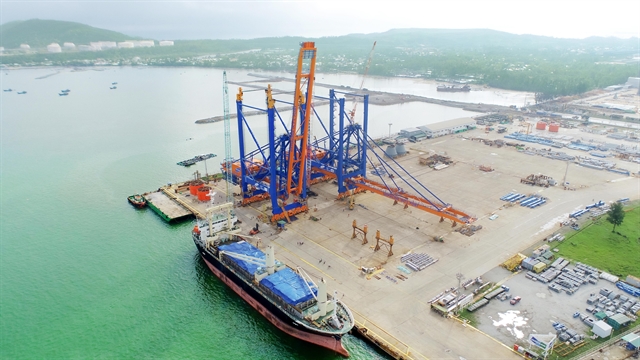The southern coastal province of Ba Ria - Vung Tau has set out its 2023 socio-economic development targets for improving its investment attraction capacity.

The southern coastal province of Ba Ria - Vung Tau has set out its 2023 socio-economic development targets for improving its investment attraction capacity.
The province has organised a conference to review the implementation of the province's socio-economic growth objectives this year and its goals for next year.
Speaking at the conference, Secretary of the provincial Party Committee and Chairman of the provincial People’s Council Pham Viet Thanh said the province’s economy is seeing a strong recovery in many fields after the COVID-19 pandemic and has achieved outstanding results.
It has set out new socio-economic development goals to achieve in 2023. Local industrial production value, excluding crude oil, is expected to increase by 9.24 per cent, total retail sales of consumer goods in 2023 is expected to increase by 11.31 per cent, while exports, excluding crude oil, are expected to be worth more than US$7.1 billion, a year-on-year increase of 11.23 per cent.
In addition, the values of agricultural, forestry and fishery production are expected to increase 4.02 per cent, 1.05 per cent and 3.18 per cent, respectively.
Total State budget revenue in 2023 is estimated to reach nearly VND86 trillion (US$3.6 billion).
The province has put in place a number of measures to reach goals that focus on promoting digital transformation, controlling the pandemic, supporting businesses in taking advantage of free trade agreements (FTAs), and restructuring the agricultural sector.
Development of industry, service, agriculture, forestry and fishery
In the industry sector, the province will focus on completing the building of a distribution centre for goods connecting Long Thanh International Airport in Dong Nai Province and a free trade area at Cai Mep area; and developing policies encouraging socialisation in investment in construction and environmentally-friendly infrastructure works at industrial clusters.
It will continue implementing the national programme on the efficient use of energy, including piloting a smart model of energy efficiency management in some buildings in the province.
In the services sector, the province continues to promote the development of seaport and logistics services. That includes completing the planning and selecting the contractor for building the Cai Mep Ha Port's logistic services centre, contributing to developing seaports and attracting more foreign investment in the local marine economy.
It will implement solutions to improve efficiency in management organisation and exploitation of seaports, especially turning Cai Mep-Thi Vai Port into an international transshipment port; speeding up transport infrastructure projects on improving inter-regional connection with surrounding provinces to increase the capacity of the Cai Mep-Thi Vai Port Complex; building intra-regional routes linking logistics centres and industrial parks at Phu My area; and speeding up the building of inland waterway ports.
Besides that, the province will promote investment in planned large-scale tourism projects. It will deploy its tourism development strategy to 2030 with a vision to 2050, including developing human resources in tourism, setting an orientation for the tourism market, promoting the brands of local tourism, and strengthening tourism promotion and cooperation.
The province will continue restructuring the agricultural sector by innovating the growth model and building new-style rural areas. It will speed up restructuring of crops to suit local natural conditions, adapt to climate change, and meet market demand. It will promote the application of mechanisation, and scientific and technological advances into agricultural production and encourage organic agricultural production.
It will continue to implement its sustainable forestry development programme in the period of 2021-25. Forest protection, management and development will be combined with eco-tourism development.
It will promote applying technologies into developing cage aquaculture, and diversify the subjects and methods of marine aquaculture with production area and output suitable to the advantages of each locality.
To attract more investment, the province will implement a number of policies to support businesses and investors to resolve difficulties they face in investing and operating.
It will strengthen investment management, implement solutions on improving the efficiency of investment attraction and the business environment, as well as enhance administrative reforms in business registration.
It also plans to improve the training of high-quality human resources to meet its requirements for the development of key sectors, including teaching foreign languages and information technology.
The rate of trained workers is expected to reach 81 per cent next year, including 34 per cent with degrees and certificates. The province aims to create around 10,500 jobs for workers next year. — VNS
- Tags
- Ba Ria - Vung Tau





